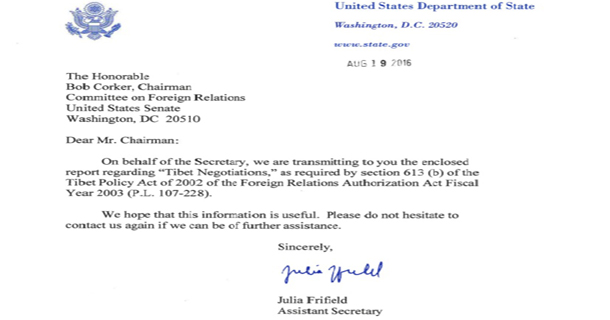 The United States government has reaffirmed its commitment to promoting dialogue between Beijing and the Dalai Lama in its most recent report on the status of the Tibet negotiations. The report raises concerns about “the unreasonable and unattainable conditions” which China wants met before it resumes dialogue with Tibet –a dialogue which has been dormant since 2010. The report also states, however, that the US does recognise the Tibet Autonomous Region (TAR) as part of the People’s Republic of China, and that it “does not conduct official diplomatic relations with the Central Tibetan Administration.”
The United States government has reaffirmed its commitment to promoting dialogue between Beijing and the Dalai Lama in its most recent report on the status of the Tibet negotiations. The report raises concerns about “the unreasonable and unattainable conditions” which China wants met before it resumes dialogue with Tibet –a dialogue which has been dormant since 2010. The report also states, however, that the US does recognise the Tibet Autonomous Region (TAR) as part of the People’s Republic of China, and that it “does not conduct official diplomatic relations with the Central Tibetan Administration.”
The document advises that failure to address the continued tensions in the Tibetan areas could be detrimental to China’s social and economic development, and would stand as obstacles for its fuller political or economic engagement with the US. “Alleviating tensions in Tibetan areas”, it continues, “would contribute to the overall stability of China.”In reference to the Dalai Lama, the report praises his “consistent advocacy of non-violence,” calling it “key in reaching a lasting solution for Tibetans.”
Several steps taken by the US to tackle the situation of Tibet are listed, including:
• President Obama raising the issue of Tibet in a joint press conference with President Xi Jinping in Beijing in September 2015
• Under Secretary Sewell meeting with the Dalai Lama twice in 2016, to discuss issues ranging from climate change to nonviolent approaches to conflict resolution
• The US delegation at the 19th US-China Human Rights Dialogue in 2015 urging China to renew dialogue with the Dalai Lama and provide greater access to Tibet for journalists and diplomats
The report also reminds the public that “the Department of State maintains contact with a wide range of religious, cultural, political, and other Tibet-related groups and individuals.” In a specific reference to the reincarnation of the Dalai Lama it states: “we believe that the basic and universally recognised right of religious freedom demands that any such decision [about the reincarnation] must be reserved to the current Dalai Lama, Tibetan Buddhist leaders, and the Tibetan people.”
The US government has been producing annual reports on Tibet since 2002, when its Tibetan Policy Act (TPA) came into force. In addition to the report, the TPA also mandated the creation of the role of Special Coordinator for Tibetan Issues. This position is currently filled by Dr. Sarah Sewell who has a long academic and political background in foreign policy and human rights issues.




 Print
Print Email
Email